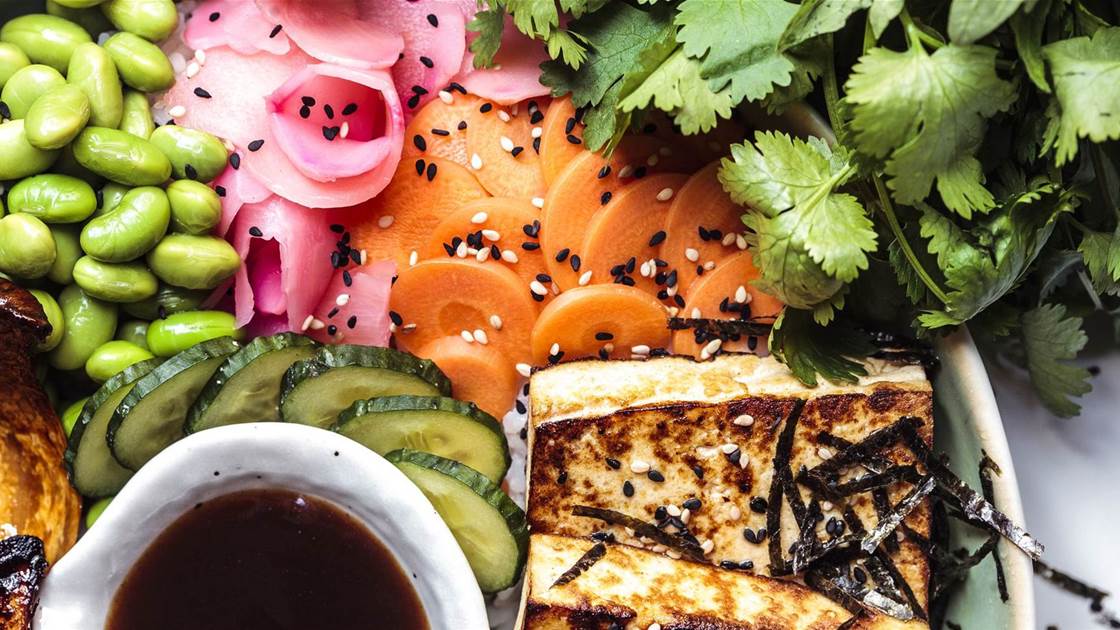People go vegan for lots of reasons: to reduce their environmental impact, to address animal cruelty concerns, to improve their health. And some people eliminate all animal products from their diet in an effort to lose weight. In fact, at press time, more than 145,000 Instagram posts had been tagged #veganweightloss. But does a vegan diet for weight loss work? Here’s what you should know about going vegan if weight loss is your ultimate goal.
First, remind me: What do vegans eat?
Like vegetarians, vegans don't eat meat. But while many vegetarians still consume some animal products, like dairy and eggs, vegans pass on them all-even honey (which is produced by bees) and gelatin (a common thickener used in packaged foods, which is made from the bones and skin of farm animals).
That leaves vegans to eat nutrient-rich fruits and veggies, protein-packed beans and legumes, hearty whole grains, and healthy fats like olive oil and avocado. But it also allows them to load up on not-so-healthy but still-technically-vegan foods, like sugary snacks, white bread and pasta, and other junk foods like potato chips.
Is veganism healthy?
When you fill your plate with healthy foods, going vegan can serve up some serious health benefits. People who follow plant-based diets have lower cholesterol, body mass index, and blood pressure, along with decreased rates of type 2 diabetes and several types of cancer.
What makes a vegan diet so healthy? Cutting red meat and dairy from your diet is one way to decrease your intake of unhealthy saturated fat, which is known to raise your risk of heart disease and stroke. Plus, plant-based diets tend to emphasise satisfying fibre, essential vitamins and minerals, and a vast variety of plant compounds (including antioxidants) that have disease-fighting properties.
But switching to a vegan diet won't automatically make you healthier. “Probably the most common mistake people make on the vegan diet is thinking everything vegan is healthy,” says dietitian Julie Devinsky. After all, hot chips and Skittles are both vegan and no one is going to tell you to start making a meal out of chocolate and carbs.
Is going vegan a healthy way to lose weight?
If a vegan diet helps you swap out empty kilojoules for nutrient-dense foods, then absolutely. “For many, weight loss on a vegan diet results from the combination of avoiding unhealthy foods and replacing those options with healthier ones,” Devinsky says. In other words, if you’re accustomed to grabbing take-out every night, making your own vegan tofu and brown rice bowl at home can help you lose weight because you are totally in control of the cooking method and what goes in it.
Still, certain vegan trade-offs can actually make you gain weight, not lose it.
You see, to lose weight on any type of diet, you need to cut the number of kilojoules you're consuming. One of the easiest ways to do that is eat fewer refined carbs and more lean protein, which will keep you fuller for longer between meals. When you don't eat any meat, though, eating more protein can be tough, because your options are more limited, explains bariatric surgeon Dr Nancy Rahnama. So a vegan eater might end up downing a bowl of carb-rich pasta instead of a plate with protein-packed chicken breast.
How to start a vegan diet for weight loss
If you want to get healthier and lose weight by trying a vegan diet, it’s important to choose the right foods.
Keep these other tips in mind next time you’re crafting a vegan meal.
Pile your plate with vegetables
Both Dr Rahnama and Devinsky recommend filling half your plate with veggies before you add anything else. That way, you have built-in portion control for the rest of your plate: fats, proteins, or whole grains.
Don’t forget protein
“For most carnivores, the meal centers around proteins-vegans can sometimes shift the focus and often fill up on breads, pasta, and rice,” Devinsky says. But going vegan shouldn’t mean ditching protein, since it can help you stay full longer (and you’re bound to experience hunger pangs once you start dropping kilos). “Consider legumes such as beans and peas as additional ways to get adequate protein,” Devinsky says.
Mind your portions
“We can overeat blueberries just as we can overeat cake,” says dietitian Robyn Goldberg.
Go whole grain
To make sure your vegan diet is healthy, avoid loading up on simple carbs (like white bread). Instead, opt for whole grains (like wild rice, oats, and quinoa) or simply swap for sources of plant-based protein, like lentils, beans, or chickpeas.
Add in healthy fats
Foods like avocados, olives, and nuts are rich in satiating mono- and polyunsaturated fats, which can help you reach a healthier weight, Dr Rahnama says.
Watch out for vegan treats
Just because a decadent-looking cookie has vegan on the label, doesn’t mean it’s any healthier than a non-vegan one. “A vegan cookie may not contain butter or eggs, but most contain vegetable oils and sugar,” Devinsky says.
This won’t do much for your waistline. “I see many patients who have gained weight after starting a vegan diet-many start eating deserts without guilt, simply because they are labeled as being vegan,” Dr Rahnama cautions.
Avoid processed foods
The same less-is-more strategy goes for processed foods-even if they’re vegan. “If you are going to have a packaged vegan food, be wary and read the label carefully,” Devinsky says. “The more ingredients you don’t recognise, the worse it is.”







.jpg&h=193&w=250&c=1&s=1)


